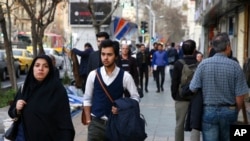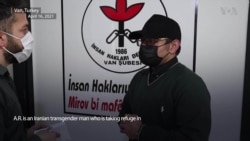For hundreds of lesbian, gay, bisexual and transgender Iranians who fled their homeland because of persecution for who they are, moving to Turkey was not a significant improvement.
Sexual and gender minorities say constant harassment and discrimination experienced in the host nation is forcing many of them to seek relocation to a third country.
A.R. is a 41-year-old transgender man who crossed into Turkey last year because of abuse from his community and Iranian authorities. Now residing in eastern Turkey's Van province, he asked VOA to conceal his full name to avoid harassment by transphobic people in the host region.
"I really wished to find a peaceful life in Iran, but my goal was not fulfilled," said A.R., who was born and raised in Tehran.
Having been assigned female at birth, A.R. attended an all-girls school as a teenager and found himself attracted to his classmates. His family deemed him mentally ill and forced him into a psychiatric hospital at age 20.
During 76 days of treatment at a Tehran facility, a doctor concluded that A.R. needed sex reassignment surgery. But the surgery was strongly rejected by his family, who first denied him any financial support and eventually disowned him.
"Because of my identity, I moved to different cities in Iran to work under disguise. Anytime my identity was being exposed, some people would have avoided me, and some others would have tried to sexually assault me," he said.
Reassignment
In his mid-20s, A.R. underwent some female-to-male sex reassignment procedures in Qom, for which the risk of a botched surgery was high. After about three years, the government changed the gender section on his identification card.
That did not end the discrimination he faced in Iran, however. His gender transition made him ineligible for any government position and exposed him to ridicule by his community. At one point, he was physically assaulted by the Basij, a paramilitary linked to the Revolutionary Guard.
"I was told that I was corrupting society or that I had manipulated God's work," A.R. said, adding that the harassment forced him to flee Iran in June 2020. "I did not want to be seen as a parasite of society."
Transgender people in Iran have the right by law to change their gender identity. In the mid-1980s, Ayatollah Khomeini in a fatwa legalized sex reassignment surgery in the country.
However, consensual same-sex sexual activity is punishable by death. The United Nations in February cited regular harassment, domestic abuse, torture, beatings and rape among the forms of widespread violation against the LGBT community in Iran.
According to the U.S. State Department's 2020 Human Rights Report, the Iranian regime pressures not only transgender people but also nontransgender members of the LGBT community to undergo sex transition.
Protection in Turkey
Because of the pervasive abuse in Iran, many LGBT people have fled to neighboring Turkey, where their status is not a crime, as in Iran, but is considered taboo.
While there are no official data on the number of Iranian LGBT refugees in Turkey, over 1,400 Iranians in 2020 sought international protection from Turkey's Directorate General of Migration Management.
Once approved by DGMM, most of the LGBT refugees reside in Turkey temporarily until their final resettlement to a Western country. Their relocation, however, is not always guaranteed because of reduced quotas in countries such as the United States and Australia.
"Only those with extreme vulnerability and meeting both UNHCR [U.N. High Commissioner for Refugees] global resettlement submission categories and criteria of each resettlement country will be considered for resettlement," Selin Unal, a spokesperson for UNHCR Turkey, told VOA.
During their lengthy wait time for resettlement to a third country, LGBT refugees have to live in a province designated by DGMM and report to the authorities regularly.
Metin Corabatir, president of the Ankara-based Research Center on Asylum and Migration, told VOA that some LGBT refugees are placed in conservative cities, where they are often exposed to homophobic and transphobic hate.
'They could not tolerate me'
Corabatir's assessment was reiterated by Arsham Parsi, an Iranian gay activist who spent 13 months in Turkey after fleeing Iran in 2005.
"I personally was a refugee in Turkey. I was in Kayseri, and that was really bad. I was beaten up several times. My shoulder was dislocated because they could not tolerate me [even though] I did not tell anyone that I am gay," Parsi told VOA.
Rights groups have reported growing anti-LGBT rhetoric among the Turkish public in recent years as the government has introduced more socially conservative policies that make LGBT people, whether refugees or Turkish citizens, more vulnerable.
Parsi, who leads the Canada-based International Railroad for Queer Refugees, said many LGBT Iranians report discrimination by DGMM officers who handle their refugee cases.
"We have a lot of reports [that] during the interviews, [LGBT Iranians] were told, 'How come you can be gay? It is against God; it is against Islam.' And then, they rejected their applications," Parsi said.
Discrimination
The State Department's 2020 human rights report noted that most LGBT refugees in Turkey were from Iran. It said they faced "discrimination and hostility from both authorities and the local population."
Fariman Kashani, an Iranian nonbinary transgender activist, shared with VOA what LGBT Iranians have to endure in Turkey's southwestern Denizli province: "I try my best not to look different when I go to streets. But if you do, they spit on your way. They are not good."
In 2016, Kashani fled Iran after being expelled from a Tehran university. Despite being accepted for resettlement in Australia in 2020, Kashani remains stranded in Turkey because of coronavirus travel restrictions.
Kashani said "the biggest issue" for LGBT Iranians such as A.R. was the uncertainty of their refugee status: "They are worried about politics — if Turkey will send them back to Iran or if any country will open their borders."
In July 2020, A.R. applied for international protection in Van province, bordering Iran. He soon found himself hounded by similar discriminatory experiences, mainly from other Iranian refugees.
"My only wish is to live like any human being and get out of this difficult situation," said A.R., adding that he pleaded with the DGMM in February to transfer him to a safer Turkish city.
While moving to a more LGBT-friendly location would be an improvement, A.R. hopes to ultimately settle in Europe, where he said he would no longer be judged for his gender identity.
"I have suffered a lot, and I wish to have a peaceful life from now on," he said.






